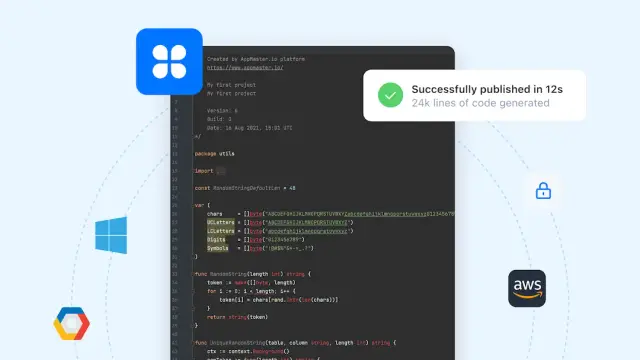HIPAA Compliance Challenges in No-Code App Development
Discover the unique challenges of ensuring HIPAA compliance in no-code app development and how no-code platforms like AppMaster help address these challenges.

The Importance of HIPAA Compliance in the Health Industry
HIPAA (Health Insurance Portability and Accountability Act) is a United States legislation that mandates the protection of sensitive patient data. Any entity that deals with protected health information (PHI) must have appropriate measures in place to ensure the confidentiality, integrity, and availability of the information. Healthcare providers, insurers, and business associates must maintain stringent privacy and security controls when handling personal health information.
Compliance with HIPAA regulations is essential to avoid the risk of substantial financial penalties, reputational harm, and potential legal ramifications. These regulations prevent unauthorized access to personal health information, safeguard patient privacy, and promote trust in the healthcare system. As a result, any organization in the healthcare industry must prioritize HIPAA compliance when developing software and applications that handle PHI.
Challenges of Ensuring HIPAA Compliance in No-Code App Development
No-code app development platforms have revolutionized the way applications are built, enabling rapid development without the need for traditional coding expertise. Yet, this approach presents new challenges regarding ensuring HIPAA compliance. Some of the significant challenges in this regard are:
- Data security and encryption: No-code platforms must provide encryption for data stored on the platform and data transmitted between client devices and backend systems. Ensuring that sensitive PHI is appropriately protected requires selecting the right encryption standards and proper implementation when developing the application.
- Audit logging and monitoring: HIPAA requires that organizations maintain an audit trail of any access or modification of PHI. This means that no-code platforms should offer built-in audit logging and activity monitoring features to help organizations keep track of user actions and detect any potential breaches or misuse.
- Access controls and authentication: Ensuring only authorized users have access to PHI is a crucial aspect of HIPAA compliance. No-code platforms must provide mechanisms to establish role-based access controls and implement strong authentication protocols to prevent unauthorized access to personal health information.
- Third-party services and integrations: Many no-code applications utilize third-party services and APIs for various purposes. Developers need to ensure that these services operate in a manner that maintains HIPAA compliance and does not compromise the privacy and security of PHI.
- Shared responsibility model: Ensuring HIPAA compliance is not solely the responsibility of the platform provider. Developers using no-code platforms must understand and follow compliance guidelines, implementing necessary safeguards throughout the development process. This requires a clear understanding of HIPAA regulations and developers' role in maintaining compliance.

How AppMaster Handles HIPAA Compliance
AppMaster is a no-code platform that recognizes the importance of protecting sensitive patient data and the unique challenges of HIPAA compliance in app development. The platform provides tools and features to help developers address these challenges effectively. AppMaster helps achieve HIPAA compliance in the following ways:
- Encryption: AppMaster supports implementing industry-standard encryption methods for data at rest (stored in the application database) and data in transit (transmitted between client devices and backend systems). This ensures the protection of sensitive PHI throughout the entire application lifecycle.
- Audit logging and monitoring: The platform offers built-in audit logging and activity monitoring capabilities, enabling developers to keep track of user actions, access to PHI, and any potential data breaches. AppMaster also allows integration with various logging and monitoring tools, ensuring a comprehensive audit trail for compliance purposes.
- Access controls and authentication: Role-based access controls allow developers to implement strict authentication processes and ensure that only authorized users can access sensitive patient data. AppMaster helps developers create custom roles and permissions, giving granular control over data access within the application.
- Secure data storage: AppMaster supports integration with secure, HIPAA-compliant data storage providers, offering an efficient way of managing PHI while minimizing the risk of data breaches or unauthorized access.
- Education and documentation: AppMaster provides documentation and resources to help developers understand the importance of HIPAA compliance and create applications that adhere to the necessary requirements. This empowers developers using the platform to make informed decisions when building healthcare applications that handle PHI.
- Access to the source code: AppMaster's enterprise subscription plan simplifies and strengthens the process of achieving HIPAA compliance for healthcare applications. One key feature is providing access to the source code of applications. This unique offering empowers customers with unparalleled flexibility, allowing them to host and manage applications directly on their infrastructure.
AppMaster strives to offer a platform that enables organizations to build HIPAA-compliant applications, considering the unique challenges that healthcare app development presents. AppMaster demonstrates its commitment to the ongoing protection of sensitive patient data and the healthcare industry's evolution by providing a foundation for secure, compliant application development.
Best Practices for Staying HIPAA Compliant Using No-Code Platforms
Ensuring HIPAA compliance in your no-code healthcare applications is a shared responsibility between you as the developer and the no-code platform you utilize. To help you navigate this process, here are several best practices to facilitate the creation of HIPAA-compliant applications on no-code platforms like AppMaster:
- Select a Platform Committed to Security and Compliance: When choosing a no-code platform for healthcare applications, it is crucial to opt for a provider that demonstrates a strong commitment to security and compliance. AppMaster is a perfect example of a platform that sets a foundation for creating secure and compliant applications by offering powerful security features and toolsets.
- Implement Encryption Methods: Protecting sensitive patient data requires implementing encryption both at rest and in transit. Choose a no-code platform that offers built-in encryption tools or supports integration with secure data storage services to keep personal health information (PHI) safe.
- Ensure Role-Based Access Controls: Implement strict authentication and authorization processes within your healthcare applications. No-code platforms like AppMaster allow you to define role-based access controls for different user types within the application, ensuring that only the right individuals have access to sensitive information.
- Regularly Monitor and Audit App Activities: Keep track of who accesses PHI and when by maintaining detailed logs of application activities. No-code platforms often provide built-in tools for monitoring and auditing user activities. Establish a routine for reviewing these logs to quickly detect potential threats and address security vulnerabilities.
- Adopt a Data Breach Response Plan: Data breaches can still occur despite your best efforts. Have a response plan to minimize the damage and make necessary alterations to the affected processes. This plan should include immediate steps to address the breach, notification strategies, and a follow-up plan to safeguard against future incidents.
- Stay Up-to-Date with HIPAA Compliance Regulations: HIPAA requirements may change as the regulatory sphere evolves. Stay informed on the latest HIPAA requirements to ensure your healthcare application is always compliant and adheres to industry best practices.
Training and Awareness for No-Code Developers
Empowering no-code developers with training programs and cultivating awareness about the intricacies of no-code development are pivotal steps toward ensuring the success and security of no-code projects. Training initiatives should encompass not only the technical aspects of the no-code platform but also provide comprehensive insights into best practices, security protocols, and compliance requirements.
Effective training for no-code developers involves hands-on sessions, workshops, and tutorials that guide them through the platform's features, functionalities, and capabilities. This practical approach enables developers to grasp the nuances of designing, implementing, and maintaining applications within the no-code framework. In addition, the training should cover fundamental programming concepts, logical structuring of applications, and troubleshooting techniques to enhance the developers' problem-solving skills.
Creating awareness about the implications of no-code development regarding security, compliance, and scalability is equally crucial. No-code developers need to understand the significance of adhering to industry regulations, especially in healthcare, finance, and government sectors where compliance is paramount. Regular updates on emerging security threats and evolving best practices should be disseminated to keep developers well-informed.
Moreover, fostering a culture of continuous learning is essential. This involves organizing webinars, forums, and discussion panels where no-code developers can share experiences, discuss challenges, and learn from each other. Encouraging participation in industry conferences and events also expands the knowledge base of no-code developers.
By investing in powerful training programs and awareness campaigns, organizations can ensure that their no-code developers are well-equipped to navigate the complexities of application development. This not only enhances the proficiency of individual developers but also contributes to the success and security of no-code projects.
Empowering Healthcare Applications with HIPAA-Compliant No-Code Solutions
No-code platforms, like AppMaster, are paving the way for rapid and cost-effective development of healthcare applications. As the demand for digital health solutions increases, leveraging no-code technology to build HIPAA-compliant applications supplies a competitive edge for healthcare providers and businesses. Here are some benefits of using no-code platforms for your healthcare applications:
Rapid Application Development
With no-code technology, developers can quickly create healthcare applications by utilizing drag-and-drop interfaces, pre-built templates, and visual workflows. This enables a faster time-to-market for health-focused products and services while reducing development costs.

Collaboration and Accessibility
No-code platforms like AppMaster offer an easy-to-use interface that invites non-technical team members to participate in the development process. This fosters better collaboration across departments and streamlines communication between healthcare professionals, IT staff, and stakeholders.
Scalability and Flexibility
No-code platforms support creating applications that can scale up or down in response to shifting business needs. This allows healthcare providers to accommodate an ever-evolving industry and adapt to changes in demand or regulatory requirements.
Maintaining Compliance Through Automated Processes
No-code platforms typically incorporate features that facilitate personal health information management and minimize the risk of data breaches. Automating certain compliance-related processes allows healthcare professionals to focus on their core responsibilities without being bogged down by regulations.
Innovation and Customization
No-code solutions empower healthcare providers to develop new products and services without being constrained by traditional software development limitations. These platforms provide the flexibility to create unique healthcare applications tailored to specific needs, resulting in better patient care and improved workflows.
Ensuring HIPAA compliance in no-code healthcare applications requires close collaboration between developers and the platform provider. No-code platforms like AppMaster have the tools and features to help developers build HIPAA-compliant applications. Healthcare organizations can create secure applications prioritizing personal health information privacy and security by adhering to best practices and leveraging no-code technology.
Future Trends and Innovations in HIPAA-Compliant No-Code Solutions
Anticipating the future of HIPAA-compliant no-code solutions involves envisioning innovations that will further streamline and enhance healthcare app development. One prominent trend is integrating advanced AI-driven tools within no-code platforms to bolster security and automate compliance checks. Machine learning algorithms can be pivotal in identifying potential vulnerabilities and ensuring continuous adherence to evolving HIPAA regulations. Moreover, incorporating blockchain technology may revolutionize data integrity and secure information exchange, offering an immutable and transparent ledger for healthcare records.
As the demand for interoperability grows, future no-code solutions will likely prioritize seamless integration with existing healthcare systems and EHR platforms, promoting a unified and connected healthcare ecosystem. Enhanced encryption protocols and data anonymization techniques will also be pivotal in fortifying the privacy and security of patient information. Furthermore, user-friendly interfaces and guided compliance features within no-code platforms will empower developers with limited regulatory expertise to navigate complex HIPAA requirements effortlessly.
Collaboration between no-code development platforms and healthcare compliance experts is expected to intensify, fostering a symbiotic relationship that ensures technical agility. Continuous updates and real-time monitoring tools within these platforms will become standard, allowing developers to adapt swiftly to changes in compliance standards and address emerging challenges promptly.
The future of HIPAA-compliant no-code solutions lies in a convergence of cutting-edge technologies, proactive compliance measures, and a commitment to user-friendly, secure application development. As the healthcare industry evolves, these innovations will simplify the development process and elevate the standard of care by ensuring the confidentiality, integrity, and availability of sensitive health data.
FAQ
HIPAA (Health Insurance Portability and Accountability Act) is a US legislation that sets the standards for protecting sensitive patient data. Healthcare providers, insurers, and business associates are required to maintain the privacy and security of personal health information to avoid substantial fines and potential reputational damage.
HIPAA compliance makes it crucial for no-code app development platforms to adhere to strict rules and guidelines surrounding patient data. This includes implementing proper encryption, record keeping, and access controls to ensure sensitive information is safeguarded at all times.
Yes, several no-code platforms like AppMaster offer robust security measures to help developers create HIPAA-compliant healthcare applications. These platforms are designed to minimize data breaches and secure personal health information.
AppMaster handles HIPAA compliance by providing developers access to tools and features that help implement the necessary security measures, such as encryption, audit logging, and role-based access controls. It supports integration with secure data storage and offers an efficient way of managing personal health information while minimizing the risk of data breaches.
Some best practices include: 1) Selecting a platform that demonstrates strong commitment to security and compliance, 2) Implementing robust encryption methods, 3) Ensuring role-based access controls with strict authentication processes, 4) Regularly monitoring and auditing app activities, and 5) Adopting a data breach response plan.
While AppMaster offers tools to help develop HIPAA-compliant applications, developers need to follow appropriate guidelines and incorporate best practices to ensure full compliance. Adhering to HIPAA regulations is a shared responsibility between the platform and the developers using it.
Besides healthcare, industries like finance, education, and government can also benefit from the security and compliance features offered by no-code platforms like AppMaster. These sectors often deal with sensitive information that requires strict privacy and security measures.
No-code platforms come with trade-offs. While they offer rapid development and ease of use, they might lack the full customization options offered by traditional coding methods. Additionally, ensuring HIPAA compliance may require some manual work on the part of the developers to ensure full adherence to the regulations.





